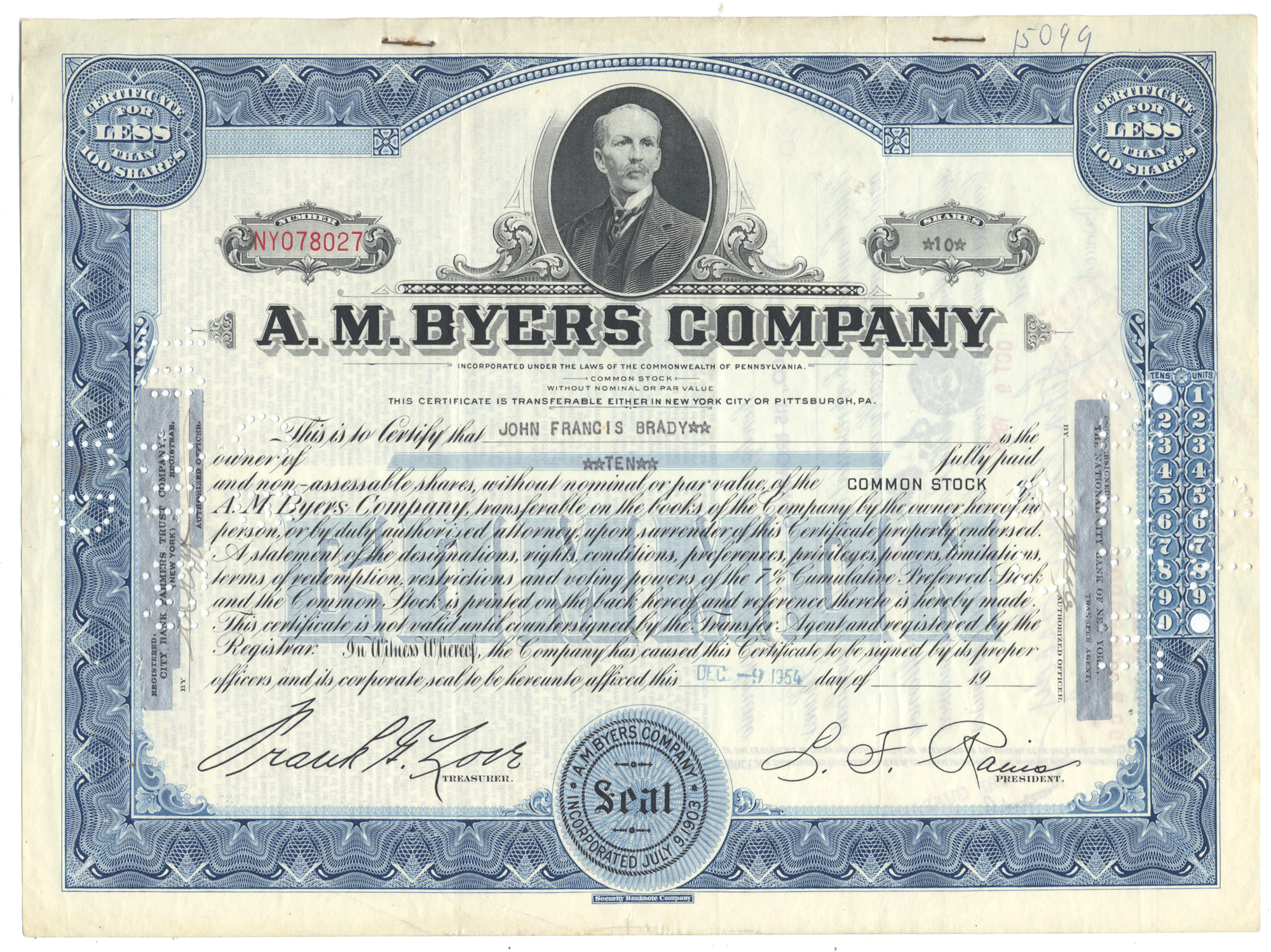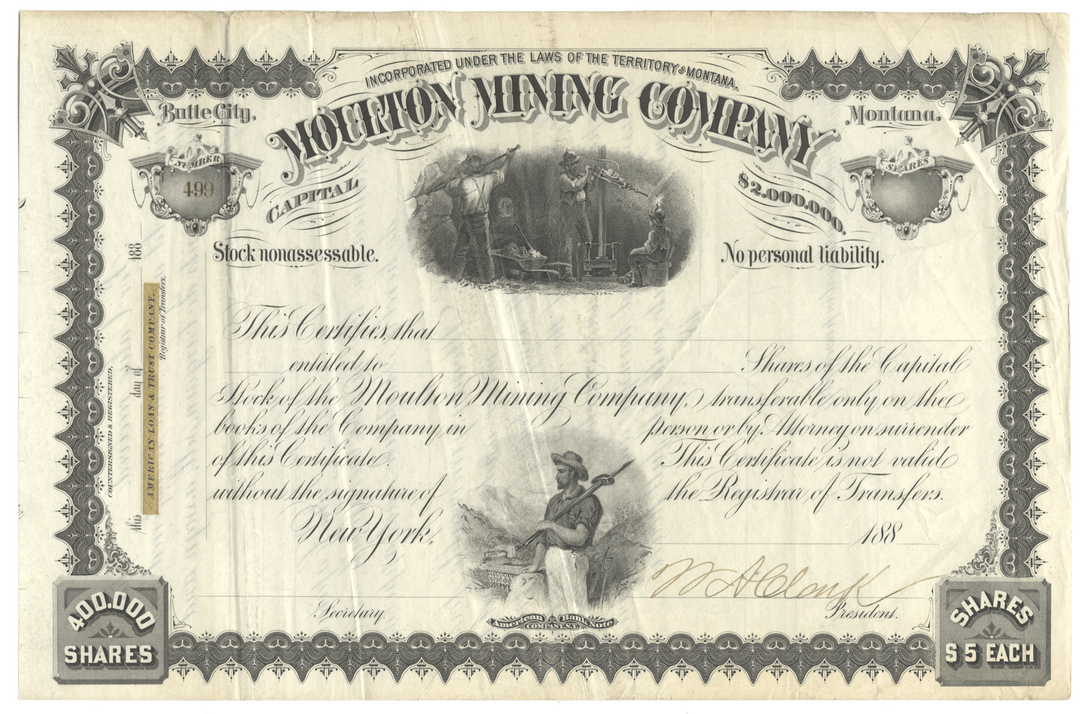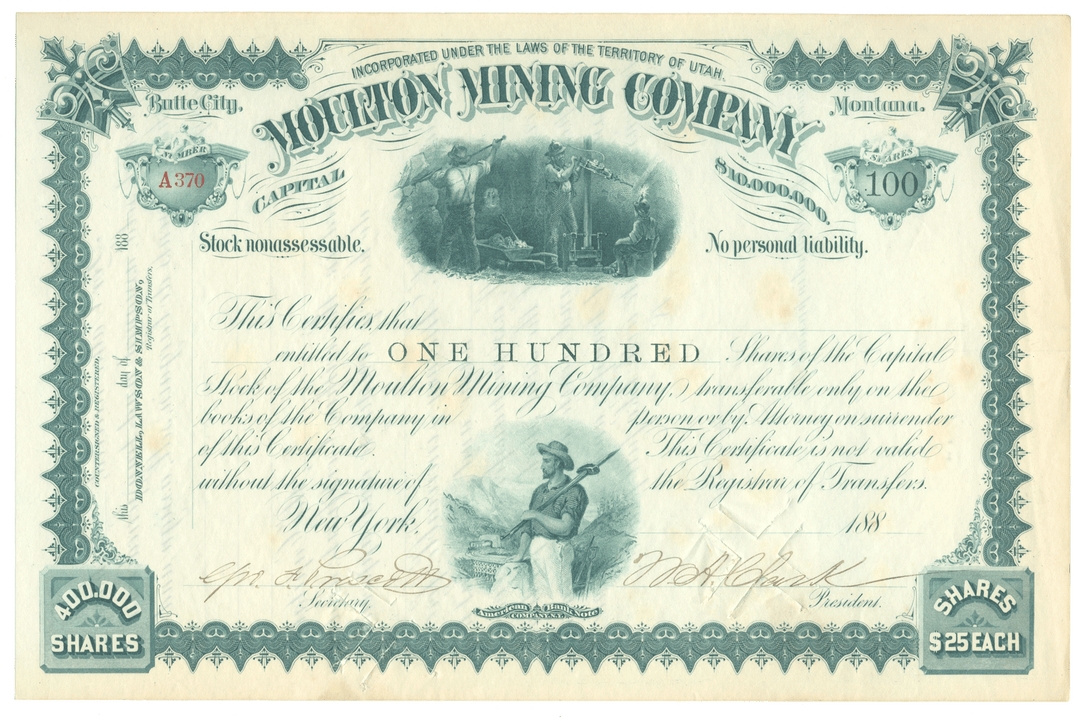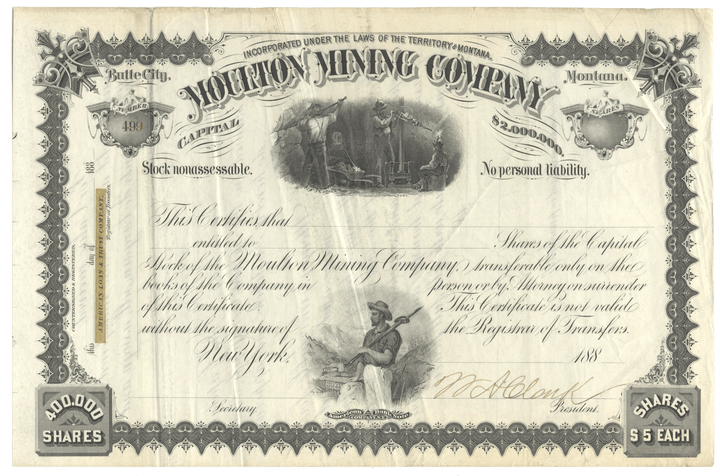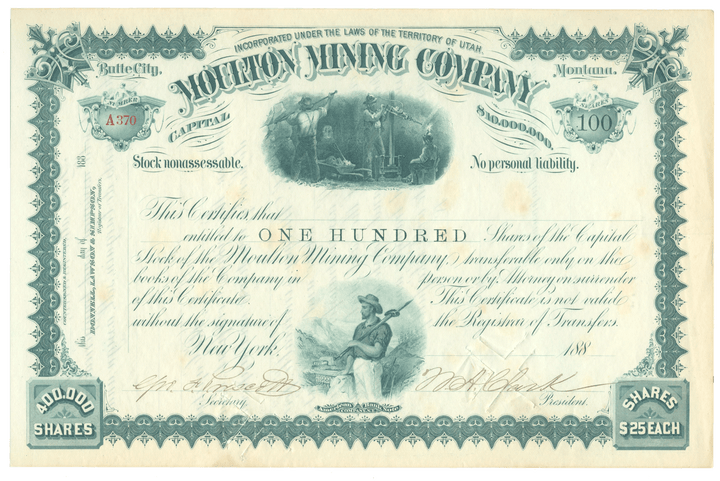Moulton Mining Company (Signed by William A. Clark)
- Guaranteed authentic document
- Orders over $75 ship FREE to U. S. addresses
Product Details
| Company | Moulton Mining Company |
| Certificate Type | Capital Stock |
| Date Issued | Unissued, circa 1880's |
| Canceled | Yes |
| Printer | American Bank Note Company |
| Signatures | Hand signed |
| Approximate Size |
11" (w) by 7 1/4" (h) |
|
Product Images |
Show the exact piece you will receive |
| Authentic | Yes |
| Additional Details | Signed by William A. Clark |
Historical Context
The Moultin Mining Company was incorporated in the Territory of Montana.
The company operated the Moulton Mine in Walkerville - just outside of Butte - in Silver Bow County.
Related Collections
William A. Clark
William A. Clark was born in Connellsville, Pennsylvania. He moved with his family to Iowa in 1856 where he taught school and studied law at Iowa Wesleyan College. In 1862, he traveled west to become a miner. After working in quartz mines in Colorado, during 1863 Clark made his way to new gold fields to find his fortune in the Montana gold rush.
He settled in the capital of Montana Territory, Bannack, and began placer mining. Though his claim paid only moderately, Clark invested his earnings in becoming a trader, driving mules back and forth between Salt Lake City and the boomtowns of Montana to transport eggs and other basic supplies.
He soon changed careers again and became a banker in Deer Lodge, Montana. He repossessed mining properties when owners defaulted on their loans, placing him in the mining industry. He made a fortune with copper mining, small smelters, electric power companies, newspapers, railroads (trolley lines around Butte and the San Pedro, Los Angeles and Salt Lake Railroad from Salt Lake City, Utah to San Pedro and Los Angeles, California), and other businesses, becoming known as one of three "Copper Kings" of Butte, Montana, along with Marcus Daly and F. Augustus Heinze.
Between 1884 and 1888, Clark constructed a 34-room, Tiffany-decorated home on West Granite Street, incorporating the most modern inventions available, in Butte, Montana. This home is now the Copper King Mansion bed-and-breakfast, as well as a museum. In 1899, Clark built Columbia Gardens for the children of Butte. It included flower gardens, a dance pavilion, amusement park, lake, and picnic areas. Clark later built a much larger and more extravagant 121-room mansion on Fifth Avenue in New York City.
Political Career
Clark served as president of both Montana state constitutional conventions in 1884 and 1889.
Clark yearned to be a statesman and used his newspaper, the Butte Miner, to push his political ambitions. At this time, Butte was one of the largest cities in the West. He became a hero in Helena, Montana, by campaigning for its selection as the state capital instead of Anaconda. This battle for the placement of the capital had subtle Irish vs. English, Catholic vs. Protestant, and non-Masonic vs. Masonic elements. Clark's long-standing dream of becoming a United States Senator resulted in scandal in 1899 when it was revealed that he bribed members of the Montana State Legislature in return for their votes. At the time, U.S. Senators were chosen by their respective state legislatures. The corruption of his election contributed to the passage of the 17th Amendment. The U.S. Senate refused to seat Clark because of the 1899 bribery scheme, but a later senate campaign was successful, and he served a single term from 1901 until 1907. In responding to criticism of his bribery of the Montana legislature, Clark is reported to have said, "I never bought a man who wasn't for sale." Clark died at the age of 86 in his mansion at 962 Fifth Avenue in New York City. His estate at his death was estimated to be worth $300 million, making him one of the wealthiest Americans ever.
In a 1907 essay, Mark Twain, who was a close friend of Clark's rival Henry H. Rogers, an organizer of the Amalgamated Copper Mining Company, portrayed Clark as the very embodiment of Gilded Age excess and corruption:
"He is as rotten a human being as can be found anywhere under the flag; he is a shame to the American nation, and no one has helped to send him to the Senate who did not know that his proper place was the penitentiary, with a ball and chain on his legs. To my mind he is the most disgusting creature that the republic has produced since Tweed's time."
Additional Information
Certificates carry no value on any of today's financial indexes and no transfer of ownership is implied. All items offered are collectible in nature only. So, you can frame them, but you can't cash them in!
All of our pieces are original - we do not sell reproductions. If you ever find out that one of our pieces is not authentic, you may return it for a full refund of the purchase price and any associated shipping charges.




